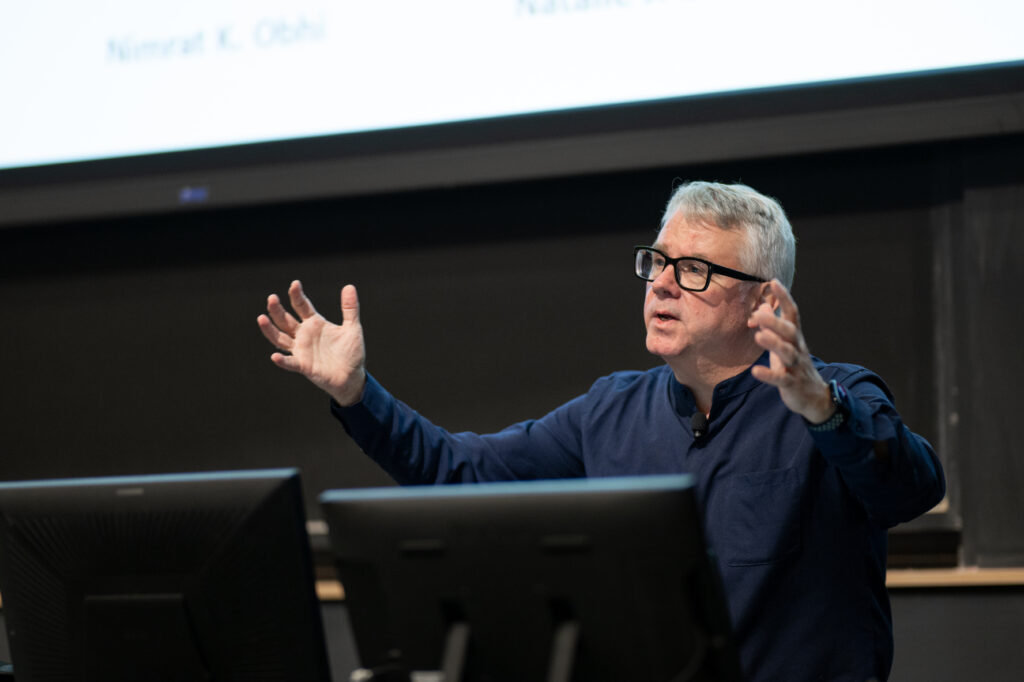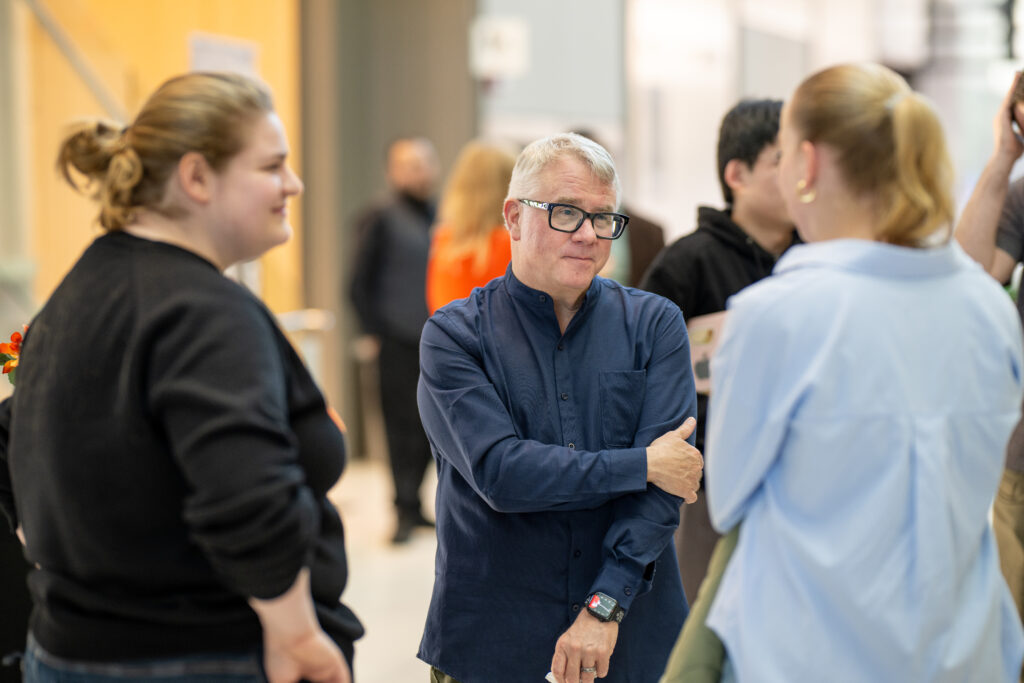Chemist John Warner *88 visits as part of GradFUTURES conference
John Warner *88—chemist, inventor, advocate—met with graduate students and faculty members at Princeton Chemistry last week to share his passion for Green Chemistry, a concept he pioneered in the mid-1990s and then parlayed into numerous startups based on a priority of benign impact.
During his talks, two at Frick Lab alone, Warner explained that green chemistry involves mechanizing the design process of new molecules so that chemists can identify potentially hazardous materials before they are even synthesized in the lab.
It has been his life’s work.

John Warner at the podium in Princeton Chemistry’s Taylor Auditorium, speaking to an audience of graduate students and faculty members.
“How do I know that what I am creating in the lab is going to be better, less expensive, more benign? I think the superpower here is chemistry,” said Warner during his talk in Taylor Auditorium. “No one can do this but chemists because it has to happen at the molecular level. It has to be done right at the beginning.
“When you are choosing reagents for your reactions, for example, that is when you ask the question: what is this going to be? We have to look at it as part of the scientific endeavor. It has to be mechanized.”
Warner was on campus as part of the 2025 GradFUTURES Forum, the annual, weeklong professional development program for graduate students and postdocs hosted by The Graduate School. His talk was co-sponsored by the Office of Sustainability to highlight the new Sustainability Learning Cohort, which launched for graduate students this spring. The program leverages the expertise of Princeton faculty, staff, alumni, and external partners to encourage students to investigate sustainable development goals as partial fulfillment toward attaining a micro-credential and certification recognizing proficiency in sustainability.
Warner, founder of the Technology Greenhouse (formerly Warner Babcock Institute for Green Chemistry) and co-author of the 1998 book Green Chemistry: Theory and Practice, was a GradFUTURES keynote speaker for the cohort.
During his talk, Warner cautioned students not to get too caught up thinking about their future careers. They should rely, instead, on the “creative magic” of the moment.
“Everyone is always asking what you are going to do next. I remember that when I was a student, I was always getting asked this. I could have told you what my career path was going to be at any point in my life and every minute of my life, it would have been wrong,” he said. “The quality of the individual you are is the work you do today. That is the most important thing.”

Warner speaking with attendees at the post-talk reception in Frick Lab.
Warner spun out his expansive talk with a quiet, folksy delivery that had audience members leaning in to hear each aphorism: “It’s about embracing the natural tendency of materials”; “my randomness is one of my strengths”; “I go into the lab and let the molecules talk to me.” He took the audience through his early education—he once considered majoring in music—ending up at Princeton Chemistry to pursue his Ph.D. under the advisership of the eminent, late Professor Edward Taylor, discoverer of the cancer drug Alimta.
Warner took a job out of graduate school with Polaroid, working there from 1988 to 1996. Then he became a full professor at the University of Massachusetts, Boston and Lowell, where he established the first Ph.D. Program in Green Chemistry. His groundbreaking book on Green Chemistry was published with his friend Paul Anastas in 1998.
The book details 12 principles that form the basis for reducing the environmental impact of harmful chemicals and negative health impacts. Among those principles are waste prevention, the use of renewable feedstocks, and chemical design for energy efficiency. As proof of its efficacy, Warner has started “green” companies in areas as disparate as asphalt paving, environmentally benign haircoloring, and water harvesting.
Warner left academia in 2007, and founded Warner Babcock, now Technology Greenhouse. In 2024, he was appointed professor of practice at the Rochester Institute of Technology. He is also a Distinguished Professor of Green Chemistry at Monash University in Australia.
“When I was at Princeton in the 1980’s I thought it was amazing, I could not imagine how it might have been better. After my visit, I certainly found out how,” said Warner, reached over the weekend after his talk. “Everywhere I turned during my visit I met faculty, staff, and most importantly, students, excited about existing and emerging programs.
“Speaking in Taylor Commons was amazing. I was simultaneous nostalgic about the triumphs of the past, excited about the present, and overwhelmingly optimistic for the future.”
